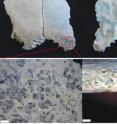Oldest evidence of regular meat consumption by early humans found
Related images
(click to enlarge)
A fragment of a child's skull discovered at Olduvai Gorge, Tanzania shows the oldest known evidence of anemia caused by a nutritional deficiency, reports a new paper published Oct. 3 in the open access journal PLOS ONE. The discovery, made by a global team of researchers led by Manuel Domínguez-Rodrigo from Complutense University, Madrid, suggests that early human ancestors began eating meat much earlier in history than previously believed. The skull fragment identified is thought to belong to a child somewhat younger than two and shows bone lesions that commonly result from a lack of B-vitamins in the diet.
Previous reports show that early hominids ate meat, but whether it was a regular part of their diet or only consumed sporadically was not certain. The authors suggest that the bone lesions present in this skull fragment provide support for the idea that meat-eating was common enough that not consuming it could lead to anemia.
Nutritional deficiencies such as anemia are most common at weaning, when children's diets change drastically. The authors suggest that the child may have died at a period when he or she was starting to eat solid foods lacking meat. Alternatively, if the child still depended on the mother's milk, the mother may have been nutritionally deficient for lack of meat.
Both cases imply that "early humans were hunters, and had a physiology adapted to regular meat consumption at least 1.5 million years ago," say the authors.
Source: Public Library of Science
Other sources
- Anthropologist finds evidence of hominin meat eating 1.5 million years ago: Eating meat may have 'made us human'from Science DailyThu, 4 Oct 2012, 14:01:49 UTC
- Early humans began eating meat earlier than thought: Oldest known evidence of anemia caused by a nutritional deficiencyfrom Science DailyThu, 4 Oct 2012, 1:00:26 UTC
- Eating meat made us humanfrom MSNBC: ScienceWed, 3 Oct 2012, 22:30:30 UTC
- Eating Meat Made Us Human, Suggests New Skull Fossilfrom Live ScienceWed, 3 Oct 2012, 21:30:31 UTC
- Scientists find oldest evidence of regular meat consumption by early humansfrom PhysorgWed, 3 Oct 2012, 21:00:57 UTC
